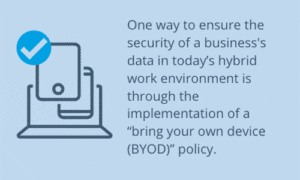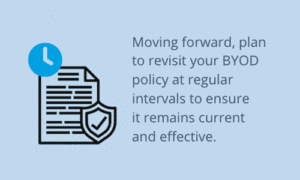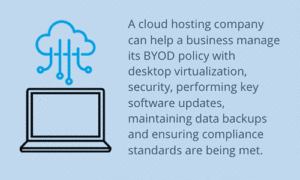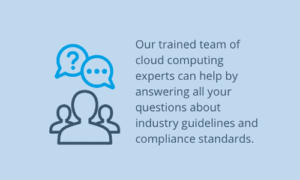
13 Feb Can Secure Cloud Services Replace Your BYOD Policy?
 Companies need to have a clear understanding of the types of personal devices employees are using to access proprietary business data. Without proper oversight, the security of your organization’s most sensitive information can be easily compromised.
Companies need to have a clear understanding of the types of personal devices employees are using to access proprietary business data. Without proper oversight, the security of your organization’s most sensitive information can be easily compromised.
One way to ensure the security of a business’s data in today’s hybrid work environment is through the implementation of a “bring your own device (BYOD)” policy.
What is a BYOD Policy?
A BYOD policy is a set of guidelines outlining the acceptable use of personal devices, such as smartphones, tablets, and laptops, to conduct company business.
These policies should include clearly defined measures such as device encryption, password requirements, and remote wipe capabilities to protect sensitive data in the event a device is lost or stolen.
For BYOD policies to be effective, businesses must also understand the types of devices that employees are using to access sensitive information. This includes not only the make and model of the devices, but also the operating system, software, and apps installed on it.
Some employee devices simply won’t meet your minimum security or compliance standards – especially in highly regulated industries.
Businesses must consider the potential legal implications of allowing employees to access sensitive information on personal devices.
How often should you update your BYOD policy?
Most businesses had to rush to develop BYOD policies following the pandemic outbreak.
 If that’s your company, it’s more than time to review and revise your policies.
If that’s your company, it’s more than time to review and revise your policies.
Moving forward, plan to revisit your BYOD policy at regular intervals to ensure it remains current and effective.
The frequency of review depends both on the specific needs of the business and the rapidly changing technology landscape.
For instance, you may still have BYOD approved devices with administrative privileges.
Recently, guidance was issued that granting these privileges to personal devices could put your organization at risk from cybercriminals.
Factors that may influence the frequency of BYOD policy reviews:
• As newer versions of operating systems are released, you may need to update the BYOD policy to reflect any new security features or vulnerabilities.
• Regulations and laws related to data security and privacy are constantly changing. BYOD policies need to be updated to stay compliant with any new regulations.
• Receiving valid feedback from employees about the BYOD policy can help you identify any areas of confusion or difficulty.
• Security review after an incident occurs. If there’s a gap in the BYOD policy creating a vulnerability, address it promptly.
When you review, make sure that all key personnel such as the IT department, legal team, and HR department, have representation to provide input during the process.
Can Cloud Hosting Solutions Play a Role in Your BYOD policy?

Cloud-based solutions virtualize desktop environments so employees can access their work environment securely from any device, including approved personal devices.
Most providers include built-in security features such as encryption, firewalls, and intrusion detection/prevention so sensitive data is protected, even when it is accessed from personal devices.
Software updates can be completed from a central location which means that all devices used to access company resources are running the same software versions. It also means that updates can be made during periods where they will cause the least amount of disruption to daily operations.
With built-in data backup and recovery capabilities you can be confident sensitive data is protected in the event of a device loss or other disaster.
Some cloud providers have the certifications to help businesses comply with regulations such as HIPAA by providing features such as data encryption, user access controls, and audit logs.
Can Cloud Services Replace a BYOD Policy?
A cloud services provider can help facilitate the implementation of your BYOD policy, but they can’t replace a comprehensive, industry appropriate, well-designed BYOD plan.
Your BYOD policy should include clearly communicated guidelines and procedures for employees regarding the use of personal devices to access company resources, as well as a plan to manage potential security risks and ensure data privacy.
We Have Experts on Staff to Answer Your Questions About BYOD Policies

Our trained team of cloud computing experts can help by answering all your questions about industry guidelines and compliance standards.
We’ll demonstrate how to use efficient cloud-based storage and processing solutions in your business to improve your security, productivity, and profitability.
Let us demonstrate exactly what Cyberlink can do for you – using your own data and workflows.